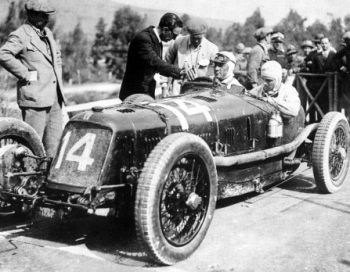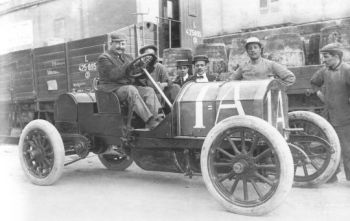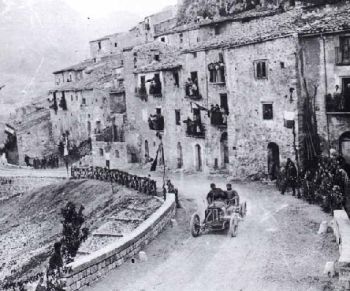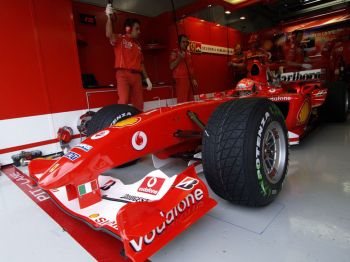 |
|
Maserati
on the Targa Florio. Along with the long-running Le
Mans 24 Hours & the mainland Italian race, the Mille
Miglia, the Targa Florio has earned its place in the
history books |
|
|
In 2006 the FIA will sanction a revival of the mythical
Targa Florio race in Sicily, that will celebrate the race's
famous history.
While little
information has been given away to the format as yet, this
centenary edition is expected to attract the cream of
drivers both past and present.
Along with the
Le Mans 24 Hours and the Mille Miglia, this is a race that
has earned its place in history.
Rumour is rife
that reigning Formula One World Champion Michael Schumacher
will drive a Ferrari, a marque synonymous with the Targa
Florio.
Also being linked with this event is former F1 champion Mika
Hakkinen, a driver still contracted to Mercedes-Benz,
another carmaker steeped in Targa tradition.
Pink Floyd
drummer Nick Mason, an avid sportscar collector and regular
historic racer in his Ferrari 250 GTO, is also reportedly
enthusiastic about taking part.
The legendary
Targa Florio, was created by Sicilian Vincenzo Florio, the
first race being held in 1906. Over the next seventy year
the countless duels and dramas of this amazing race embedded
themselves in the sport's folklore.
|
 |
|
This Fiat 50hp is seen here competing in the 1908
Targa Florio race, the third edition of the tough
Sicilian race |
|
|
By the time of the first race, Vincenzo had already secured
himself a place in local legend when, having imported a
French motor-tricycle to Sicily, he organised the island's
first race. However as he owned the sole car on the island,
the race took place against a cyclist and a horserider.
The first Targa
Florio was run over three laps of the island, the distance
totalling around 275 miles.
Competitors on that first event raced over twisting mountain
roads with constant with sheer drops, and surfaces that were
virtually unchanged since the Punic wars. On top of this
wolves, bandits and different weather conditions all
conspired against the drivers.
This first
running saw only ten cars taking part after a strike at
Genoa docks held up some of the competitors. After nine
hours of racing, Alessandro Cagno won the race at an average
speed of 29.06mph.
Hugely popular with the locals, the legendary race was born,
and the year after saw more than fifty entries arrive,
including a Fiat driven by none other than Vincenzo Lancia.
After a break
for World War One, the event resumed and proceeded to gather
pace. In 1921 the factory teams turned up: Alfa Romeo with
no less than four cars, and Fiat with two. |
|
|
Countless races
became muyths. The 1930 edition is a good example. Achille
Varzi, driving an Alfa Romeo P2 raced into an early lead
ahead of his arch-rival Tazio Nuvolari.
However, over the rough mountain roads his spare wheel began
to work itself loose, and in the process, it punctured the
petrol tank.
Despite the fact
that Varzi was forced to stop more often for fuel, he hung
onto the lead. At the last fuel stop the riding mechanic
also grabbed a spare can of fuel.
Drama struck when, as the mechanic attempted to refuel while
at speed, petrol spilt onto the hot exhaust pipes, causing
an instant fire.
Unwilling to
stop and hand victory to his deadly rival, Varzi continued
to press on.
The move paid off, and he crossed the finish line to claim
victory in dramatic fashion, his mechanic frantically
attempting to keep the flames at bay by beating the fire
with his seat cushion.
|
 |
|
Scene
from the 1907 Targa Florio, the second running of
the event which saw more than fifty entries
combating the changing conditions, wolves & bandits |
|
|
Yet another edition to enter history was the 580.32-mile
1955 race, which saw victory go to factory Mercedes-Benz
drivers, Stirling Moss and Peter Collins.
The German company, who had already announced they would
quit motor racing at the end of that season, arrived with no
less than five 300SLRs, nearly fifty mechanics and seven
trucks. Other drivers on the team included Argentinean,
Juan-Manuel Fagio.
Despite starting
last, Moss passed the entire field on the first of thirteen
laps. A crash dropped him down the field, from which he
recovered, while co-driver Peter Collins also went off the
track before the pair swept to victory.
The race
continued into the mid 1970's before safety issues forced
its abandonment.
Now, in 2006,
on the hundredth anniversary of that first race, full FIA
sanction will see this legendary race remembered in a style
that it truly deserves.
Racing fan the
world over will eagerly await this chance to relive the
glories and the legends that unfolded with each dramatic
encounter.
|
 |
|
Rumour
is rife that reigning Formula One World Champion
Michael Schumacher, seen here at the wheel of the
F2004, will drive a Ferrari, a marque that is
synonymous with the Targa Florio |
|
|
![]()
![]()